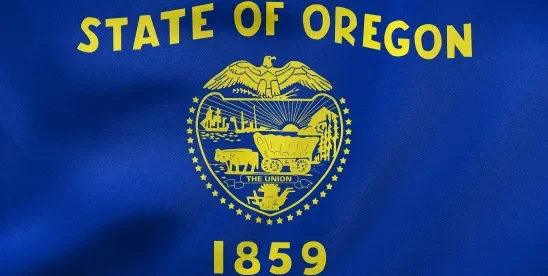Quick Hits
- Significant new limitations on restrictive covenants with healthcare practitioners relating to noncompetition, nondisparagement, and nondisclosure took effect on June 9, 2025.
- Employers will soon be prohibited from asking an applicant’s age, date of birth, or date of graduation from any educational institution prior to an interview or conditional job offer.
- Starting in January 2026, striking workers will be eligible for up to ten weeks of unemployment benefits during a strike.
Workplace Accommodations for Agricultural Workers (HB 2541)
Governor Kotek signed House Bill (HB) 2541 into law on May 7, 2025. Under HB 2541, certain agricultural workers must now be provided with the same accommodations for the expression of breast milk during work hours that have been provided to employees in other industries. Those accommodations include rest periods and a private location to express breast milk that is not a public restroom or toilet stall and that is in close proximity to the employee’s work area. Employers in the agricultural industry may want to review their policies and check their facilities to ensure compliance with HB 2541.
Effective: May 7, 2025
Healthcare Noncompete Agreements (SB 951 and HB 3410)
On June 9, 2025, Governor Kotek signed into law Senate Bill (SB) 951, which, among other things, imposed significant new limitations on restrictive covenants with healthcare practitioners relating to noncompetition, nondisparagement, and nondisclosure. The limitations were modified by separate legislation, HB 3410. Learn more about SB 951 and HB 3410 from our article, “Oregon Imposes Limitations on Restrictive Covenants in Agreements With Healthcare Practitioners.”
Effective: June 9, 2025, but with additional rolling effective dates
Statute of Limitations When BOLI Charge Filed (HB 2957)
HB 2957 changes the statute of limitations in employment cases when individuals file a charge with BOLI. Complainants no longer have a strict ninety-day deadline to sue after receiving the agency’s “right to sue” notice in some circumstances. Employers are also prohibited from entering into agreements with former, current, or prospective employees that would have the effect of shortening the statute of limitations for violations enforceable by BOLI. Learn more about HB 2957 from our article, “Oregon Clarifies Time Frames for Filing Civil Actions in Employment Cases.”
Effective: June 24, 2025
Unemployment Insurance for Striking Workers (SB 916)
Governor Kotek signed SB 916 on June 24, 2025. The law allows striking workers to be eligible for up to ten weeks of unemployment benefits during a strike. Employees must wait one week before becoming eligible for unemployment benefits, subject to a possible limit based on the tax schedule in effect at the time. The law requires benefits to be paid back if the employee later receives back pay that results in an overpayment of benefits. School districts will also be required to deduct from the employee’s future wages the benefits charged for weeks during a strike. Although New Jersey, New York, and Washington State grant some unemployment benefits to striking workers, public employees in those states are barred from striking. Oregon is now the first state to offer unemployment benefits to both striking public and private employees.
Effective: January 1, 2026
Liability for Property Owners (SB 426)
Governor Kotek signed SB 426 into law on June 9, 2025. The new law makes a property owner, contracted buyer, or lessee, and a direct contractor jointly and severally liable in a civil action for any unpaid wages owed to the unrepresented employees of the direct contractor and subcontractors at any tier for construction work performed within the scope of the construction contract. SB 426 defines “unrepresented employee[s]” as those employees who are “[n]ot represented by a construction trade labor organization” or employees who are “[n]ot covered by a collective bargaining agreement” that includes, among other provisions, “a mechanism for recovering unpaid wages … on behalf of the employees.” The law does not apply to construction work done to an owner’s principal residence or a property with five or fewer residential or commercial units on a single tract. Employers engaging contractors to perform work and employers in the construction industry may want to be aware of the implications of this new law. As a first step, employers in the construction industry can review their pay policies to ensure legal compliance.
Effective: January 1, 2026
Age Discrimination in Hiring (HB 3187)
On May 22, 2025, Governor Kotek signed HB 3187 into law. The law prohibits employers from requesting or requiring an applicant’s age, date of birth, or date of graduation from any educational institution prior to completing an initial interview, or if there is no initial interview, prior to making a conditional offer of employment. Two exceptions are provided: (a) when the employer needs the information to comply with an applicable law, or (b) when the information is required to affirm that the applicant meets bona fide occupational qualifications. To ensure compliance, employers will want to review their hiring practices, including their application materials, before HB 3187 takes effect.
Effective: September 26, 2025
Oregon Sick Leave Use for Blood Donation (SB 1108)
Governor Kotek signed SB 1108 into law on May 28, 2025. SB 1108 allows eligible employees to use leave earned under Oregon’s sick time law to donate blood through a voluntary program approved or accredited by the American Association of Blood Banks or the American Red Cross. Employers may want to revise their sick leave policies now to comply with this new law.
Effective: January 1, 2026
Paystub Clarity (SB 906)
On May 28, 2025, Governor Tina Kotek signed SB 906 into law. SB 906 requires employers to provide employees with a written explanation of the earnings and deductions shown on their paystubs at the time of hire. Learn more about SB 906 from our article, “Oregon Enacts Wage Deduction Transparency Law.”
Effective: January 1, 2026
Changes to Paid Leave Oregon (SB 69, SB 858, and SB 859)
SB 69 allows an employer to require an employee to obtain certification from their healthcare provider that they are able to resume work after a period of medical leave under Paid Leave Oregon. The bill also exempts certain flight crew employees from the OFLA eligibility requirements if they meet federal hours of service requirements.
SB 858 makes technical changes to the Paid Leave Oregon program, including allowing an authorized agent to act on behalf of a deceased or incapacitated individual with respect to their Paid Leave Oregon benefits.
SB 859 allows the Oregon Employment Department to compromise, adjust, or write off certain debts and overpayments under the Paid Leave Oregon program.
Effective: September 26, 2025
Creation of BOLI’s Employer Assistance Division (HB 2248)
HB 2248 establishes the Employer Assistance Division within BOLI. The Employer Assistance Division will provide education, training, and interpretive guidance, including advisory opinions, to assist employers in complying with laws enforced by BOLI. Notably, under HB 2248, BOLI is prevented from imposing a penalty on employers that prove they relied on discussions with the Employer Assistance Division in taking any good faith action. Employers may look to the Employer Assistance Division as another resource when faced with compliance issues.
Effective: September 26, 2025




 />i
/>i

